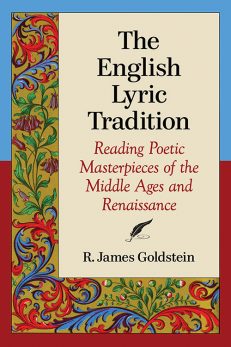Subtotal: $39.95
The English Lyric Tradition
Reading Poetic Masterpieces of the Middle Ages and Renaissance
Original price was: $39.95.$31.99Current price is: $31.99.
In stock
About the Book
Modern readers can sometimes be unsure about the language and the literary conventions of medieval and Renaissance verse—lyrical works written at a time before poetry was assumed to be about personal expression. This readers’ guide introduces to a 21st century audience some of the greatest masterpieces of English poetry spanning five centuries. Focusing on poems by Chaucer, Wyatt, Shakespeare, Milton and others, the author discusses the development of poetic technique, explains the rhetorical culture of earlier centuries and describes the various lyric forms—including lover’s complaints, sonnets and elegies—that poets used to communicate with readers.
About the Author(s)
Bibliographic Details
R. James Goldstein
Format: softcover (6 x 9)
Pages: 236
Bibliographic Info: appendix, notes, bibliography, index
Copyright Date: 2017
pISBN: 978-1-4766-6475-0
eISBN: 978-1-4766-2756-4
Imprint: McFarland
Table of Contents
Table of Contents
Acknowledgments ix
Introduction—Canonical Forms 1
1. Vernacular Eloquence: Reading Older Poetry Rhetorically 11
2. What Was a Lyric Poem? 41
3. Anonymous Middle English Lyrics on the Virgin Mary 59
4. The Love Complaint Ballade: Chaucer and Wyatt 72
5. The Love Sonnet from Wyatt to Shakespeare 90
6. The Country House Poem: Lanyer and Jonson 132
7. The Pastoral Elegy: Milton’s “Lycidas” 152
Coda—The Irish Dancer 183
Appendix—A Modified Version of Attridge’s Scansion Symbols 185
Chapter Notes 187
Bibliography 207
Index 217
Book Reviews & Awards
“The English Lyric Tradition is a thoughtful and intelligent volume…. Professor Goldstein’s is a courteous and informative guide throughout, wearing his learning lightly and demonstrating a patience and open-minded regard for the reader which will help to persuade more people to turn to the poetry he values so highly.—Andrew Hadfield, PN Review.

 A Journal of the English Civil War
A Journal of the English Civil War 





